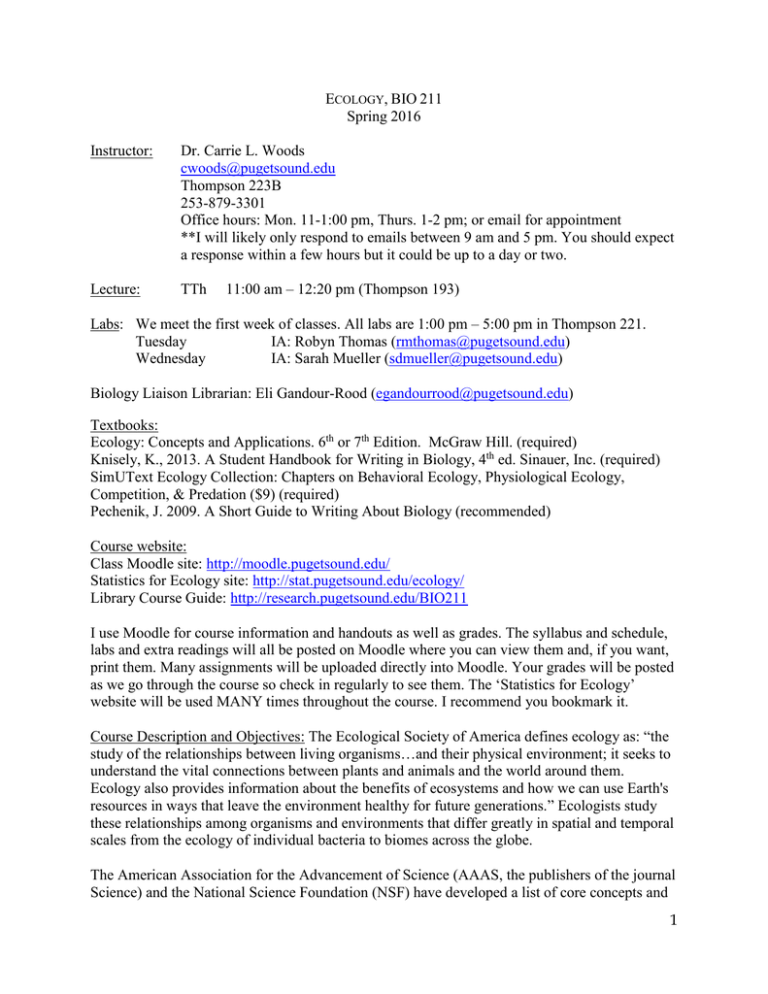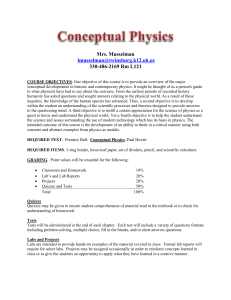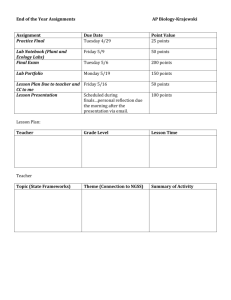E , BIO 211
advertisement

ECOLOGY, BIO 211 Spring 2016 Instructor: Dr. Carrie L. Woods cwoods@pugetsound.edu Thompson 223B 253-879-3301 Office hours: Mon. 11-1:00 pm, Thurs. 1-2 pm; or email for appointment **I will likely only respond to emails between 9 am and 5 pm. You should expect a response within a few hours but it could be up to a day or two. Lecture: TTh 11:00 am – 12:20 pm (Thompson 193) Labs: We meet the first week of classes. All labs are 1:00 pm – 5:00 pm in Thompson 221. Tuesday IA: Robyn Thomas (rmthomas@pugetsound.edu) Wednesday IA: Sarah Mueller (sdmueller@pugetsound.edu) Biology Liaison Librarian: Eli Gandour-Rood (egandourrood@pugetsound.edu) Textbooks: Ecology: Concepts and Applications. 6th or 7th Edition. McGraw Hill. (required) Knisely, K., 2013. A Student Handbook for Writing in Biology, 4th ed. Sinauer, Inc. (required) SimUText Ecology Collection: Chapters on Behavioral Ecology, Physiological Ecology, Competition, & Predation ($9) (required) Pechenik, J. 2009. A Short Guide to Writing About Biology (recommended) Course website: Class Moodle site: http://moodle.pugetsound.edu/ Statistics for Ecology site: http://stat.pugetsound.edu/ecology/ Library Course Guide: http://research.pugetsound.edu/BIO211 I use Moodle for course information and handouts as well as grades. The syllabus and schedule, labs and extra readings will all be posted on Moodle where you can view them and, if you want, print them. Many assignments will be uploaded directly into Moodle. Your grades will be posted as we go through the course so check in regularly to see them. The ‘Statistics for Ecology’ website will be used MANY times throughout the course. I recommend you bookmark it. Course Description and Objectives: The Ecological Society of America defines ecology as: “the study of the relationships between living organisms…and their physical environment; it seeks to understand the vital connections between plants and animals and the world around them. Ecology also provides information about the benefits of ecosystems and how we can use Earth's resources in ways that leave the environment healthy for future generations.” Ecologists study these relationships among organisms and environments that differ greatly in spatial and temporal scales from the ecology of individual bacteria to biomes across the globe. The American Association for the Advancement of Science (AAAS, the publishers of the journal Science) and the National Science Foundation (NSF) have developed a list of core concepts and 1 skills in which every science undergraduate should be literate. Here is a very brief statement of their vision with the areas underlined that you will develop in Ecology: “Students should be competent in communication and collaboration, as well as have a certain level of quantitative competency, and a basic ability to understand and interpret data. To be current in biology, students should also have experience with modeling, simulation, and computational and systems-level approaches to biological discovery and analysis, as well as with using large databases.” --AAAS & NSF Vision and Change Executive Summary In this course, you will learn about the ecology of individuals, populations, communities, and ecosystems. To better your communication and collaboration skills, you will work in pairs to conduct an independent research project (more information below). Throughout the course you will have several writing assignments where you will develop skills of effective library research, careful interpretation of the primary literature, and clear scientific writing. You will develop an understanding of ecological theory, develop quantitative skills by learning and using mathematical and computer models to understand ecological processes, and develop quantitative and graphical skills by analyzing and presenting your own data. The development of statistical analysis skills provides you with independence and power to interpret any data you collect. As such, we will devote both lecture and lab time to learn about statistics and use them to analyze data that you collect both for labs and for your independent research project. During this course you should… 1. Become familiar with different levels of organization within the study of ecology; 2. Understand ecological theory, processes and patterns; 3. Become familiar with the methods by which ecological knowledge develops; 4. Learn and utilize analytical statistics and computer modeling to further advance your understanding of complex ecological relationships; 5. Develop and test hypotheses concerning ecological processes, and communicate your findings in written, graphical and oral formats; 6. Think critically and logically about relationships between evidence and explanations; 7. Build upon your skills of graphical data interpretation & construction, library research, clear scientific writing, and oral presentation of scientific data; 8. Ask interesting ecological questions, design experiments to test them, collect relevant data, use statistics to analyze data, and present the results effectively. Coursework: Your grade in this course will be determined by your participation in lecture and lab, including frequent in-class questions and activities, as well as your performance on the following course components: Quizzes & Exams: There will be 4 quizzes and 3 midterm exams and one final comprehensive exam. Quizzes and exams will cover material from all aspects of the course (e.g., labs, readings, etc.), but will focus on material from lecture. Questions will be designed to assess your understanding of facts and concepts, your ability to apply facts and concepts to novel situations, and your ability to interpret graphical, tabular, and statistical representations of ecological data. Your goal is to demonstrate in writing a clear understanding of various ecological concepts. 2 There are no make-up quizzes or exams. See the course schedule for the dates of your quizzes and exams and mark them on your calendar today. If you anticipate a problem, see me immediately. If you miss an exam due to an unforeseen emergency and can provide appropriate documentation, I may take this into consideration when assigning final grades. In keeping with University policy, the final exam will be given ONLY at the time indicated in the course schedule. NOTE: The syllabus lecture schedule is a tentative one. We may move ahead or get behind. All quizzes and exams will be given on the dates scheduled regardless of where we are in the discussion. I will announce what materials each quiz or exam will cover. Throughout the course I will use PowerPoint and the blackboard to help convey information. I’ll provide any non-text figures used in presentations in Moodle. I do not provide copies of lecture notes so you should strive to attend every lecture. Cell phones & Laptops: cell phones should be turned OFF during lecture and lab. You should NOT use a laptop to take notes. I have provided a link in Moodle to explain why. Independent Projects (IP’s): During this course, you will design, conduct, analyze, and present original research in ecology. Although we will call these “independent” projects, you are expected to work in groups of two. These projects should be fun and rewarding. The more thought you put into developing a project you really care about, the better your experience will be. So, start thinking about potential topics for your study as soon as possible and discuss them with me and your IA. You should aim to develop a specific, limited question that can be answered in the available time period. Also, be sure that the study you develop involves accessible organisms, and supplies/equipment that are either already available or easy and cheap to obtain. Read the ‘Past independent projects’ file on Moodle for ideas from past projects. A proposal of your research plan is due in lecture during Week 7. Once you have approval for your plan, you will need to dive into your experimental set-up and data collection. While working on your project, it will be your responsibility to care for any captive organisms required for your study (even over Spring Break!), to deal with the organisms once your project is complete, and to coordinate with the stockroom staff. Realize that several other classes and all your classmates will be using the same limited pool of resources. So, do not expect to be able to request, order, or sign-out supplies at the last minute! Plan ahead and always be courteous to the staff! Your project will culminate in both written and oral presentations of your research. All written portions of your IP (proposal, progress reports, final paper) should be written independently even though you are working in groups. However, your presentation and abstract are done together. Complete and thorough clean-up of your Independent Project (including proper disposal of any organisms, cleaning and storage of all supplies and equipment, cleaning of study area, etc.) is required. Failure to do will result in a 10% penalty off your final paper. Labs: Labs are required and will begin promptly at 1:00. If you have a problem making it to a particular week’s lab, please ask at least one week in advance to attend a different lab period (if possible). I will try my best to accommodate one such request from each student, but please understand that such accommodation cannot be guaranteed. Missing two or more labs may be cause for withdrawal from the course. 3 Several labs will involve working outside – rain or shine. The dates of these labs are set (denoted as FIELD on your schedule). On these days, coming to lab prepared includes being dressed appropriately! Wear good walking shoes (sneakers or hiking boots) and long pants. Bring layers of clothing (including rain gear) to deal with possible weather variations, pencils (which write better in the rain than do pens), and perhaps a clipboard. Be prepared to get wet, walk through high vegetation, etc. All the fun of field work! For most labs, you will turn in pre-lab questions at the start of lab. Pre-lab questions will not be accepted late. During many lab periods, you will complete a worksheet or problem set that will be turned in for grading at the end of that lab period. Assignments for labs you did not attend will not be graded, although you are encouraged to do the work anyway (if logistically possible) to receive feedback on it. Some lab exercises will result in formal writing assignments. You will write partial scientific papers based on Week 1’s activities (due Week 5) and on an experiment you run Weeks 5-7 (due Week 11). Clear scientific writing is a very important skill that usually requires a great deal of effort and practice to perfect. I will do my best to help you improve as a writer by teaching you how to write and giving you a great deal of feedback on your writing. In return, I expect that all of your written assignments will be pieces of professional work of which you are proud. All your written work should be well-edited, double-line spaced, page numbered, and free of typographical errors. Three lab periods are set aside for IP work. On these days, you must check in with me in the lab room at the start of your lab period. Do not expect to complete your entire project in these three time periods. Your independent project will require work outside of lab time, and you should get started on them as soon as your proposal is approved. Turning in Assignments: All assignments will be turned in through Moodle (unless stated otherwise). There will be Assignment icons in Moodle that allow you to upload your assignments. This saves paper, allows me to send comments back to you outside of class, prevents lost assignments and time-stamps your submission. Feedback will be done using Track Changes in Word and uploaded directly to Moodle. You will receive an email when I upload my edits. Assignments should be uploaded to Moodle at the start of lecture or lab as indicated on the individual assignment and lecture schedule. Please ONLY send a WORD DOCUMENT file and use the file naming format: your last name-assignment (e.g., Johnson-Assignment 1). Late Policy: Any assignments that can be turned in late will lose 10% a day (including weekends), down to 0%. I cannot accept any written assignments after the start of our final exam. Work turned in late on the same day that it is due will be considered ½ a day late and be assessed a penalty of 5% of the original point value. TO BE FAIR TO ALL STUDENTS, I MUST STRICTLY ENFORCE THIS LATE POLICY. I may consider waiving the penalty only in a case of a medical or family emergency. Written documentation of the nature of the emergency may be required. An extra-curricular activity, travel, or work in another course is not a valid reason for late work. If you must miss class for one of these reasons, it is your responsibility to check the lecture schedule and assignment guidelines to determine if anything will be due in your absence. Please check with me if you are unsure. Course Policies: You are responsible for all material covered in lectures, portions of the text assigned during lectures, and readings listed on the syllabus. In lecture periods, you will be given 4 information that is not in the textbook and (as stated earlier) I don’t post my lecture notes. Therefore you must attend lectures and take detailed notes if you want to do well in the course. See the handout on Moodle for how to effectively take notes. The list of readings from the required book is in the schedule. I will give ample notice for readings. I will add other reading material that we will discuss directly into Moodle as pdf files. You are responsible for printing, reading, and either bringing them to class or critically evaluating them before coming to class. I would also suggest reading the material again after class to solidify the findings. Group Work: There will be times over this course where you will work on group assignments and/or utilize data collected while working in groups. Each and every graded assignment based on such effort must be your own work. For the tables or figures, you each must make your own, even if you work together and help each other. Anyone handing in someone else’s work or printing multiple copies of the same work to be handed in separately will be treated as plagiarism. Office of Accessibility and Accommodation: If you have a physical, psychological, medical or learning disability that may impact your course work, please contact Peggy Perno, Director of the Office of Student Accessibility and Accommodations, Howarth 105, pperno@pugetsound.edu, 253.879.3395. She will determine with you what accommodations are necessary and appropriate. All information and documentation is confidential. If you are enabled extra time on an exam, you must give me the form from the Office of Student Accessibility and Accommodations ONE WEEK before any exam (at the start of class is best so I can provide adequate accommodations). Generally, extra time is not given for inclass quizzes but if you absolutely need extra time for the quizzes, please come and talk to me the first week of class. Student Bereavement Policy: Upon approval from the Dean of Students’ Office, students who experience a death in the family, including parent, grandparent, sibling, or persons living in the same household, are allowed three consecutive weekdays of excused absences, as negotiated with the Dean of Students. For more information, please see the Academic Handbook. Classroom Emergency Response Guidance: Please review university emergency preparedness and response procedures posted at www.pugetsound.edu/emergency/. There is a link on the university home page. Familiarize yourself with hall exit doors and the designated gathering area for your class and laboratory buildings. If building evacuation becomes necessary (e.g. earthquake), meet your instructor at the designated gathering area so she/he can account for your presence. Then wait for further instructions. Do not return to the building or classroom until advised by a university emergency response representative. If confronted by an act of violence, be prepared to make quick decisions to protect your safety. Flee the area by running away from the source of danger if you can safely do so. If this is not possible, shelter in place by securing classroom or lab doors and windows, closing blinds, and turning off room lights. Lie on the floor out of sight and away from windows and 5 doors. Place cell phones or pagers on vibrate so that you can receive messages quietly. Wait for further instructions. Academic and Scientific Integrity: Academic honesty is a fundamental principle of intellectual endeavor. Scientific integrity is an integral part of the scientific process. You are expected to be honest and respectful in all aspects of this course. I assume that you have committed to the University’s Standards of Integrity (http://www.pugetsound.edu/student-life/studenthandbook/student-integrity-code/university-standards-of-integr/), and that you have read and understand the University’s policies on Academic Integrity (http://www.pugetsound.edu/studentlife/student-handbook/academic-handbook/academic-integrity/) as outlined in The Student Handbook. Please talk to me if you have any questions about this information. Of particular relevancy to this course, the following forms of academic and scientific dishonesty will not be tolerated: 1) 2) 3) 4) Cheating of any kind Alteration, fabrication, or other misuse of scientific data Unauthorized removal of or damage to library materials Plagiarism Students often are confused about plagiarism, which is an intellectual property violation. It occurs when one person misrepresents someone else’s work/words/data/figures/etc. as their own, whether or not this misrepresentation is intentional. Avoiding plagiarism requires an active approach, as even poor note-taking can result in unintentional plagiarism! Please review http://www.pugetsound.edu/academics/academic-resources/cwlt/writing/writingresources/plagiarism/ and Chapter 3 in Knisely’s A Student Handbook for Writing in Biology (2013) for more information and helpful hints for avoiding this form of academic dishonesty. An act of academic dishonesty will result in a zero for the assignment linked to the offense, assuming it is your first offense. If it is your second offense, you may receive an F for the course. Additional penalties may apply as the University requires that all acts of academic dishonesty are reported to the Dean of Students, who may opt to impose further sanctions. It is your responsibility to make sure that you know and completely understand what constitutes academic dishonesty and plagiarism. It is your responsibility to read and understand the UPS policies on Academic Integrity (http://www.pugetsound.edu/student-life/personal-safety/studenthandbook/academic-handbook/academic-integrity/ ). By becoming a part of the UPS community and taking this course, you are stating that you have read the information on the UPS web page and that you fully understand what constitutes plagiarism and the penalties for academic dishonesty. 6 Grading Final grades will be determined based on the total points accumulated by each student. The maximum number of points possible is shown below: Bio 211 Assignment Overview Assignment Due date Points Quizzes and Exams 510 Quizzes (4@15 ea) 2/4, 2/25, 4/7, 4/28 60 Midterm Exams (3 @ 100 pts each) 2/11, 3/24, 4/19 300 Final Exam (comprehensive) 5/10 150 Other course assignments 40 SimUText readings & questions (8 sections x 5 pts 40 each) Labs 260 Pre-lab questions (10 @ 5pts each) 50 In-lab worksheets, problem sets and post-labs 150 Writing goals (optional extra credit: 4 x 5 pts each) Week: 2, 4, 8, 10 (20) Ecological patterns report: Methods & Results 2/18 20 Duckweed report: Methods, Results & Discussion 3/31 40 Independent Project 195 IP Brainstorming worksheet Week 6 in lab 5 IP Proposal 3/3 30 IP Progress Reports (4) Week: 10, 11, 12, 14 20 IP Introduction outline and Methods Week 13 in lab 20 IP Presentation (10) and Participation (10) Week 15 in lab 20 IP Written Report 5/3 100 Overall Participation* 15 TOTAL POINTS 1020 *Participation includes showing up for class and lab, participating in class and lab (discussions, asking questions), and in-class assignments (observation, hypothesis, experiment). 7




